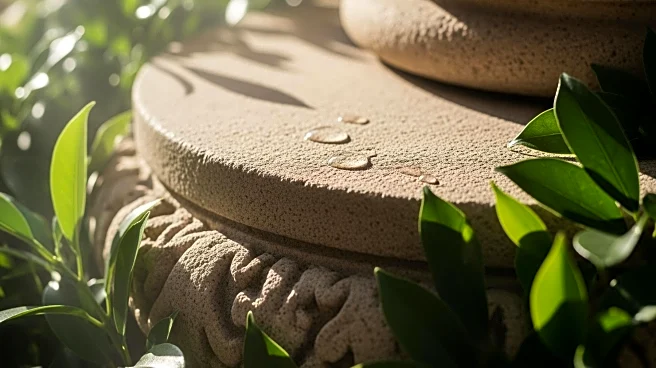What's Happening?
A recent study has investigated the use of essential oils from the Lamiaceae family as eco-friendly solutions to combat the biodeterioration of historical monuments caused by black fungi. These fungi, particularly from the genus Capnobotryella, are known
for their ability to colonize and degrade stone materials such as marble, limestone, and sandstone. The research focused on the antifungal efficacy of essential oils from O. majorana, O. minutiflorum, and M. longifolia subsp. typhoides against these fungi. The study was conducted under controlled in vitro conditions, assessing the concentration-dependent effects of these oils on fungal isolates from the Ancient City of Side. The findings suggest that essential oils could serve as sustainable alternatives to synthetic biocides, offering a natural method for preserving cultural heritage sites.
Why It's Important?
The preservation of historical monuments is crucial for maintaining cultural heritage and legacy. Traditional methods of conservation often involve chemical treatments that can have adverse environmental and health effects. The use of essential oils presents a promising alternative, aligning with the growing consumer demand for natural products. Essential oils offer a sustainable approach to mitigating fungal growth, which is a significant factor in the deterioration of stone monuments. By providing an eco-friendly solution, this research could influence future conservation practices, reducing reliance on synthetic additives and promoting the use of natural biocides in the restoration of historical sites.
What's Next?
The study's findings could lead to the development of new conservation strategies that integrate essential oils with advanced delivery systems, such as nanotechnology, to enhance their stability and efficacy. Further research may explore the application of these oils in different environmental conditions and their effectiveness against various types of stone and microorganisms. Conservationists and policymakers might consider adopting these eco-friendly methods in preservation efforts, potentially influencing regulations and standards in the field of cultural heritage conservation.
Beyond the Headlines
The use of essential oils in monument preservation highlights broader implications for environmental sustainability and public health. As natural products gain popularity, industries such as food, pharmaceuticals, and cosmetics may increasingly incorporate essential oils into their offerings. This shift could drive innovation in product development and influence consumer behavior towards more sustainable choices. Additionally, the integration of natural biocides in conservation practices may encourage interdisciplinary collaboration between botanists, chemists, and conservationists, fostering advancements in eco-friendly technologies.















